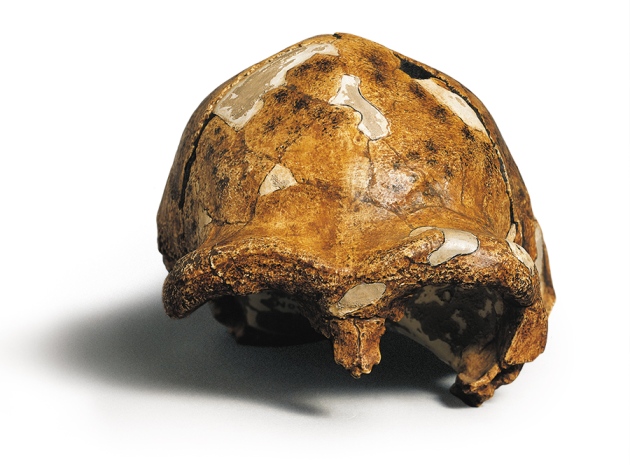 |
| The reconstructed skull of Peking Man, the fossil that launched discussions of human origins in China. DeAgostini/Getty |
Fossil finds in China are challenging ideas about the evolution of modern humans and our closest relatives.
Jane Qiu. On the outskirts of Beijing, a small limestone mountain named Dragon Bone Hill rises above the surrounding sprawl. Along the northern side, a path leads up to some fenced-off caves that draw 150,000 visitors each year, from schoolchildren to grey-haired pensioners. It was here, in 1929, that researchers discovered a nearly complete ancient skull that they determined was roughly half a million years old. Dubbed Peking Man, it was among the earliest human remains ever uncovered, and it helped to convince many researchers that humanity first evolved in Asia.
Since then, the central importance of Peking Man has faded. Although modern dating methods put the fossil even earlier — at up to 780,000 years old — the specimen has been eclipsed by discoveries in Africa that have yielded much older remains of ancient human relatives. Such finds have cemented Africa's status as the cradle of humanity — the place from which modern humans and their predecessors spread around the globe — and relegated Asia to a kind of evolutionary cul-de-sac.
But the tale of Peking Man has haunted generations of Chinese researchers, who have struggled to understand its relationship to modern humans. “It's a story without an ending,” says Wu Xinzhi, a palaeontologist at the Chinese Academy of Sciences' Institute of Vertebrate Paleontology and Paleoanthropology (IVPP) in Beijing. They wonder whether the descendants of Peking Man and fellow members of the species Homo erectus died out or evolved into a more modern species, and whether they contributed to the gene pool of China today. [...] Nature News & Comment
Related news:11 July, 2016. 178,000 years of Chinese history? That’s really something to chew on | South China Morning Post
Discovery of three ancient human teeth in a cave in Guizhou adds piece to puzzle of Chinese origins...
Actualización: Cómo China está reescribiendo el libro sobre los orígenes de los seres humanos
En las afueras de Pekín, una pequeña montaña de piedra caliza llamada Hueso de Dragón se eleva por encima de la extensión de los alrededores. Junto al lado norte, un camino conduce hasta unas cuevas cercadas que atraen a 150.000 visitantes cada año, desde escolares hasta pensionistas de cabello gris. Fue aquí, en 1929, cuando los investigadores hallaron un antiguo cráneo casi completo, el cual determinaron tenía aproximadamente medio millón de años. Apodado el 'Hombre de Pekín', fue uno de los primeros restos humanos descubiertos, y ayudó a convencer a muchos investigadores de que la humanidad había evolucionado primero en Asia.
Desde entonces, la importancia central del 'Hombre de Pekín' se ha desvanecido. Aunque los métodos de datación modernos sitúan al fósil con hasta 780.000 años de antigüedad, el espécimen ha sido eclipsado por los descubrimientos realizados en África, los cuales han proporcionado restos mucho más antiguos de parientes humanos. Tales hallazgos han cimentado al continenete africano como la cuna de la humanidad -el lugar a partir del cual los seres humanos modernos, y sus predecesores, se expandieron por todo el mundo- y relegando la evolución en Asia a una especie de cul-de-sac...







No hay comentarios:
Publicar un comentario